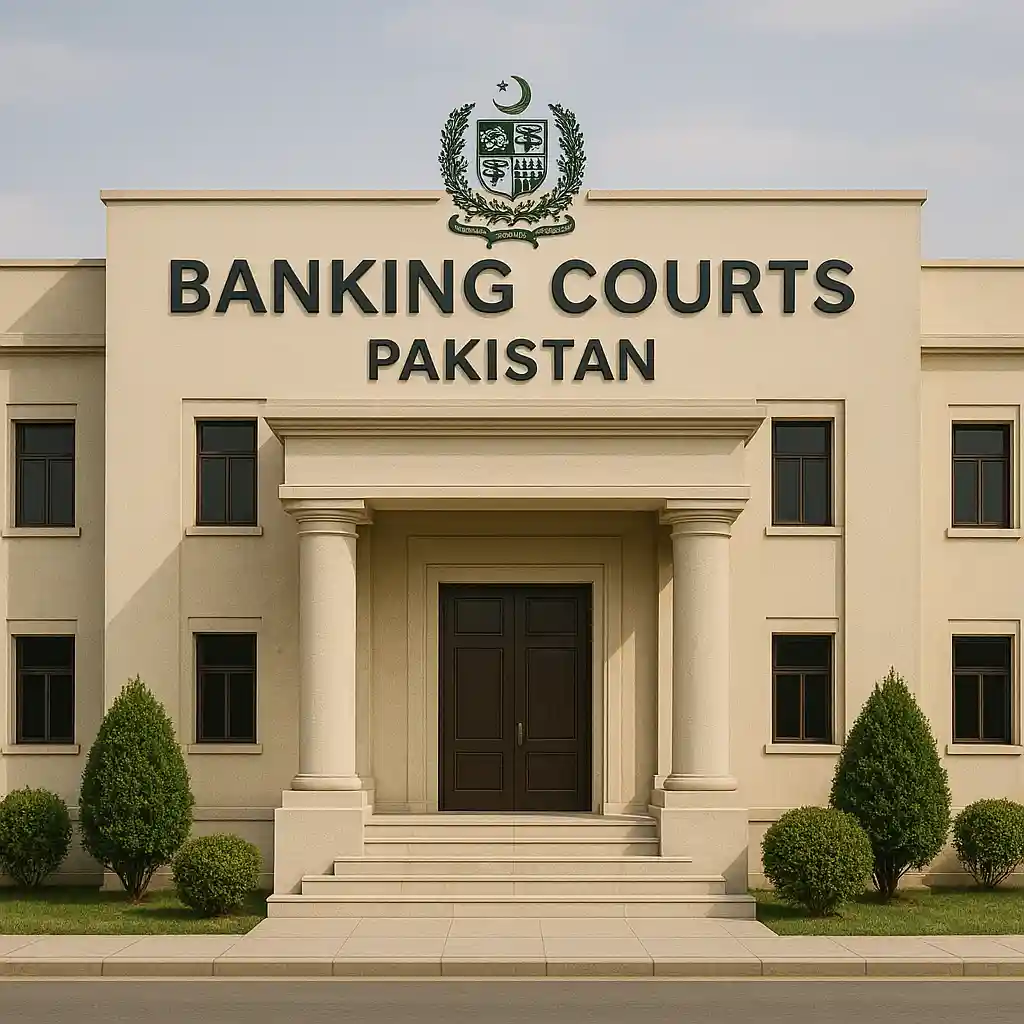Pakistan’s Banking Courts, established under the Financial Institutions (Recovery of Finances) Ordinance, 2001 (FIO 2001), are specialized tribunals resolving financial disputes like loan defaults, cheque fraud, and contractual breaches.
A pivotal 2025 Supreme Court ruling clarified their exclusive jurisdiction over financial contracts, excluding tort claims such as harassment or emotional distress.
With Pakistan transitioning to a riba-free (interest-free) banking system by 2028 under the 26th Constitutional Amendment, these courts face unprecedented challenges in adapting to Sharia-compliant finance.

This guide integrates 2025 case law, jurisdictional boundaries, and emerging reforms to provide actionable insights for stakeholders.
Legal Framework & Jurisdictional Scope
1. Founding Legislation & Authority
Banking Courts derive their mandate from FIO 2001, empowering them to:
- Expedite recovery of bank loans and enforce financial agreements.
- Adjudicate cases involving cheque dishonoring under the Negotiable Instruments Act, 1881.
- Prosecute financial fraud under the Offences in Respect of Banks Ordinance, 1984.
The federal government establishes these courts in consultation with provincial high courts, appointing judges with prior experience as district or high court judges.
2. What Banking Courts CANNOT Do
A landmark 2025 ruling (Ali Raza vs. Habib Bank Limited) clarified that Banking Courts lack jurisdiction over:
- Tort claims (e.g., mental distress from wrongful asset seizure).
- Tax disputes (e.g., advance-to-deposit ratio penalties).
- Property disputes unrelated to loan collateral.
Such cases must be filed in civil courts.
Key Functions & Case Resolution
1. Loan Recovery Process
Under FIO 2001, banks must follow strict pre-trial protocols:
- Issue a 90-day default notice to the borrower.
- Submit authenticated documents (loan agreements, payment records) to the court.
- Attend a mandatory case management hearing within 30 days of filing.
In 2025, the Lahore Banking Court approved a record Rs10.2 billion settlement in Bank Makramah vs. Omni Group, emphasizing the system’s focus on swift resolutions.
2. Cheque Dishonoring Cases
Banking Courts prioritize cheque fraud cases under Section 489-F of the Pakistan Penal Code, with penalties including:
- Imprisonment up to 3 years.
- Fines up to triple the cheque amount.
3. Collaboration with the Banking Mohtasib
The Banking Ombudsman resolves minor disputes (e.g., hidden charges) without formal trials. In 2025, 65% of complaints were settled through mediation, reducing court backlogs.
Banking Courts vs. Civil Courts: 2025 Comparison
| Aspect | Banking Courts | Civil Courts |
| Jurisdiction | Loan defaults, cheque fraud, financial contracts | Tort claims, property disputes |
| Case Duration | 6–9 months (average) | 18–24 months (average) |
| Appeals | Filed directly in Provincial High Courts | District Court → High Court |
| Evidence | Documentary proof (e.g., bank statements) | Oral testimony + documents |
Islamic Banking Transition: Challenges for 2028
Pakistan’s shift to riba-free banking under the 26th Constitutional Amendment (2024) will reshape Banking Courts’ operations:
- New Contract Types: Disputes over Murabaha (cost-plus financing) and Ijara (leasing agreements) require judges to interpret Sharia principles.
- Pending Reforms: A 2025 State Bank committee is drafting amendments to FIO 2001 to align recovery processes with Islamic law.
- Case Study: In Meezan Bank vs. Al-Abbas Industries, the Karachi Banking Court dismissed a case citing “non-Sharia-compliant interest clauses,” signaling stricter scrutiny of conventional loan terms.
Critical Challenges & Reforms
1. Controversial “Leave to Defend” Rule
Under FIO 2001 Sections 9–10, borrowers must seek court permission to contest cases—a process criticized for violating Article 10-A (right to fair trial). In 2025, 72% of “leave to defend” applications were rejected, raising concerns about bias.
2. Case Backlogs
Despite streamlined procedures, Pakistan’s 15 Banking Courts face 12,000+ pending cases due to rising loan defaults. The Lahore High Court recently mandated digital case tracking systems to improve transparency.
3. Accountability of Recovery Agencies
Aggressive tactics by third-party recovery agents (e.g., public shaming) prompted the Punjab Consumer Protection Act (2025 Amendment) to impose fines up to Rs500,000 for harassment.
FAQs:
Q1: Can Banking Courts freeze my property?
Yes, if it’s pledged as collateral. However, they cannot seize unrelated assets.
Q2: What if my bank charges hidden fees?
File a complaint with the Banking Mohtasib for fast resolution.
Q3: How does the riba ban affect existing loans?
Pending legislation will outline terms for converting interest-based loans to Islamic modes like Musharaka.
Q4: Are foreign bank branches under Banking Court jurisdiction?
Yes, if they operate within Pakistan.
Q5: Can I appeal a Banking Court verdict?
Yes, to the respective Provincial High Court within 30 days.
